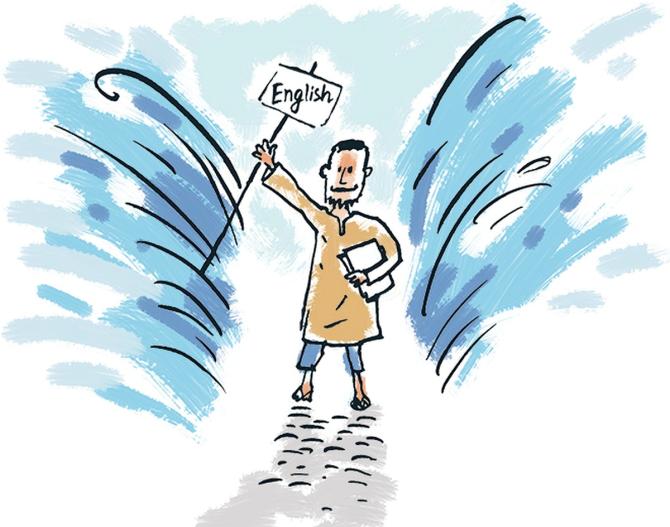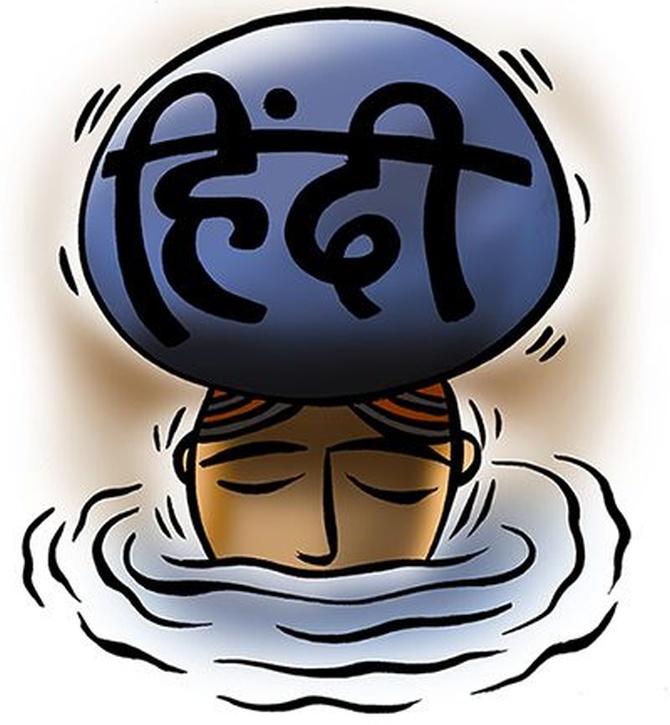Anybody who's plugged in to the modern, globalised world will understand why, says Kanika Datta.

The debate over whether Hindi should be an official language, a national language and a compulsory language in schools is at least as old as independent India.
But in the third decade of the 21st century, this issue is long past its sell-by date -- barring, of course, for a Parivar that harks back to a spurious and mythical ancient past of Hindi-Hindu dominance.
If India wants to become an economic power of any reckoning in the world, the question of knowing or not knowing Hindi is irrelevant.
Instead, the Centre and state governments should focus their energies on making English compulsory in schools and Mandarin a second language.
Anybody who's plugged in to the modern, globalised world will understand why.
For historical reasons -- first, the global sprawl of the British Empire, then US Superpowerdom -- English has become the global lingua franca, somehow resisting the best efforts by non-English speakers to establish Esperanto as a universal language for at least 100 years.
Today, even the French and Germans are shedding their famous cultural aversion for the language, at least in business settings.
As for Mandarin, it's the world's most spoken language after English (Hindi ranks third and Bengali sixth, reflecting perhaps the spread of India's Diaspora).
But more to the point, Mandarin is the language of the rising superpower and India's chief Asian adversary.
On the old know-thy-enemy adage it would be useful if more Indians (not least Indian soldiers) were fluent in it.
Indian language chauvinists could argue that the Chinese, who display the same fervent pride in their language as Indians have in their myriad tongues, acquired their global dominance without any meaningful knowledge of English.
True, even today, a minuscule proportion of Chinese -- less than 1 per cent by some estimates -- speak English (and the literal translations from an essentially ideographic language have long been the source of much hilarity).
But the political conditions and economic policies that made China a dominant economic power manifestly do not exist in India, no matter how much Indian governments seek to emulate them.

If India rose to global notice at all in the past three decades it has been on the back of the booming IT and IT-enabled services business that drew on India's English-knowing population.
This is an inconvenient truth embedded in India's colonial past and conveniently ignored by the same muscular nationalists who fete India's global IT prowess.
But this language bounty is spread thinly, limited to middle, upper middle and rich Indians who can afford to educate their children in quality English-medium schools.
That is why India's reputation as an IT superpower is quite out of proportion with its actual impact on employment; the industry employs about 4.5 million people, a drop in the ocean of the 450 million workforce.
The impact remains negligible even if we stretch it to the 'indirect' employment of 12 million that the industry claims.
In the current aggressive environment of Hindi/Hindu majoritarianism, English-knowing Indians tend to be sneered at as urban elitists, the Khan Market and Lutyens' Delhi variety coming in for particular contempt.
But that only reflects the resentments generated by inequality in opportunity.
It is a problem governments can easily address by making English compulsory as a first language in state schools and allowing students to choose a second language from a bouquet of Indian and foreign languages (of which Mandarin should be one).
That would easily enable many more Indians to bridge much more than a language barrier.
International investors in Vietnam have cited English-knowing workers at factory-worker and supervisory levels as a reason for preferring that tiny country over India's vast and talented human resource base.
About half the Vietnamese population can speak English compared to just 10 per cent in India.
Such knowledge will become even more vital as corporations move towards greater automation.
Without this practical investment in English medium education, larger cohorts of young Indians, most of them likely to emerge from the Hindi belt ironically, will find themselves locked out of economic opportunity in the emerging knowledge economy.
If the government needs any proof of this, it only needs to look as far as West Bengal where a Marxist government, stuffed with western-educated leaders, dropped English from the state syllabus in the eighties.
Apart from introducing such incongruities as forcing teachers to teach Shakespeare in Bengali, that policy condemned a whole generation of Bengali youth to unemployment in a declining state.
The policy was reversed in the nineties but too late to stop the rot.
No doubt Home Minister Amit Shah has to make the occasional demand for the primacy of Hindi as chair of the parliamentary committee on official language.
But for a government that purports to address the interests of aspirational Indians, this is the wrong campaign to choose.
Feature Presentation: Rajesh Alva/Rediff.com











